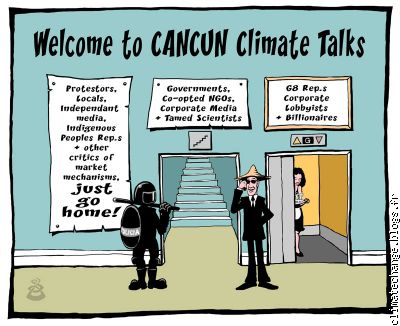Climate Change
Comment on Chair's Note
Le 11/12/2010
The COP16 President in apparent good faith has put forward a text that she believes reflects where the talks are at current, but the text has some serious deficiencies.
First, the President claims the text is based on negotiations, however, there were no negotiations, but rather small group or bi-lateral consultations. The Chair's Note was not negotiated at all; it was merely dictated by the Chair trying to guess what the States think and would have negotiated had they been given the chance to do so. The apparent reason for doing it this way is that negotiations would not have arrived at a compromise. Maybe there is a reason for this? Maybe the States do not agree on the texts and could not agree in negotiations. This does not mean that they never could agree, but that hey did not in this instance. One reason the States did not agree may have been that they were to given the chance to do so in negotiations.
Second, the President's Note
 Commentaires textes : Écrire
Commentaires textes : Écrire
Informal meeting with Chair starts at about 21:00
Le 11/12/2010
COP16 President starts by introducing her text and asks States to accept it.
Bolivia speaks first and opposes text saying it needs to be discussed further and asks President to open discussion. He also points out that UN security tried to prevent him from entering the room. The Chair apologized for unfortunate UN security action, although such action seems to be repeated frequently by UN security at COP16. Venezuela and Nicaragua supported Bolivia.
Yemen, G77 coordinator, thanks President but does not really express view on text.
Lesotho expresses support on behalf of LDC's, contradicting the concerns the same LDC coordinator expressed earlier in day about emissions limits and financing.
Saudi Arabia requests text be sent to WG...doesn't say, but obviously doesn't like CSS exclusion.
Cuba support Bolivia pointing out shortcomings on emissions, no KP target renewal, and financing problems. Ecuador says text needs improvement. Indonesia and Zambia says text not perfect but that we need to move forward.
Maldives supports text enthusiastically, despite the fact that the 2 degree limit will likely mean Maldives will sink under rising water levels. How can a Minister tell his people he has done his job as best as he could?
Rep. of Korea, Switzerland, Peru, Australia, European Union, Singapore, Turkey, Uruguay, Bangladesh, Guyana, USA, UAE, Senegal, Philippines, Kenya, Costa Rica, China, Pakistan, Tajikistan, Afghanistan, Japan, Algeria (African Group), India, Columbia, Chile, Brazil, Argentina, Jamaica, Timor East, Benin, Tanzania, and Kuwait supports text.
Bolivia speaks first and opposes text saying it needs to be discussed further and asks President to open discussion. He also points out that UN security tried to prevent him from entering the room. The Chair apologized for unfortunate UN security action, although such action seems to be repeated frequently by UN security at COP16. Venezuela and Nicaragua supported Bolivia.
Yemen, G77 coordinator, thanks President but does not really express view on text.
Lesotho expresses support on behalf of LDC's, contradicting the concerns the same LDC coordinator expressed earlier in day about emissions limits and financing.
Saudi Arabia requests text be sent to WG...doesn't say, but obviously doesn't like CSS exclusion.
Cuba support Bolivia pointing out shortcomings on emissions, no KP target renewal, and financing problems. Ecuador says text needs improvement. Indonesia and Zambia says text not perfect but that we need to move forward.
Maldives supports text enthusiastically, despite the fact that the 2 degree limit will likely mean Maldives will sink under rising water levels. How can a Minister tell his people he has done his job as best as he could?
Rep. of Korea, Switzerland, Peru, Australia, European Union, Singapore, Turkey, Uruguay, Bangladesh, Guyana, USA, UAE, Senegal, Philippines, Kenya, Costa Rica, China, Pakistan, Tajikistan, Afghanistan, Japan, Algeria (African Group), India, Columbia, Chile, Brazil, Argentina, Jamaica, Timor East, Benin, Tanzania, and Kuwait supports text.
 Commentaires textes : Écrire
Commentaires textes : Écrire
Bolivia voices concerns over two new 'Cancun' texts
Le 11/12/2010
Bolivian Ambassador Solon on the two 'Cancun' texts released on 10 December 2010:
On the KP text:
>There is no timeframe for 2nd emission targets period under Kyoto Protocol,
>There is a reference to SB/2010/X, which doesn't exist.
>Opens all possibilities for base year.
>Flexibility mechanisms would continue even if no 2nd period of emission targets under Kyoto Protocol.
In conclusion, text is imbalanced. Flexibilities will continue without commitments.
Shared vision:
>2 degree long-term goal instead of 1 or 1.5 degree.
>Para 8 is included. Bolivia has struggled for this language.
>No mentioning of starting discussion process on Mother Earth's rights, neither on International Tribunal for Environmental Justice.
>Nothing on military or weapon industry-related emissions.
Mitigation:
>Annex I commitments are not in Annex B of KP, but listed in LCA.
>Developing countries actions listed, even if no finance and technology transfer.
>No assessment process on current market mechanisms, as proposed by Bolivia.
>Establishment of new market mechanisms.
>Nothing on emission taxes or mechanisms regarding regulations.
Forests:
>No mechanism for evaluating REDD.
>No explicit exclusion of carbon markets.
>Objective is assessment of forests in terms of carbon absorption, with a view to linking it to the carbon market.
Other general comments:
>Green Fund created.
>Two entities for technology created.
>Fundamental issues, i.e. the resources needed for these mechanisms have to operate, are not addressed.
>Language contradicts Art 3 UNFCCC; for example, mobilizing; instead of providing finance.
>World Bank as interim trustee.
>AGF report says that less than 50 percent of 100 billion would be public; the rest would be loans and private sector participation and resources provided by developing countries.
Adaptation:
>Nothing on how resources will be secured.
>Intellectual property rights are not even mentioned.
>Technology Centre won’t deal with IP issues.
>No dialogue on impacts of IPs on technology transfer.
In conclusion, the text reflects mainly the contents of the Copenhagen Accord.
On procedure, it is not clear what will happen with the LCA text. Bolivia is enormously concerned, as text contains views of only a select number of parties. Are we in a "take it or take"; scenario? Parties never agreed to ask for a document like this.
Bolivia is going to voice its concerns in the formal session, which starts in a few minutes. Bolivia does not feel alone - it has a mandate given by the peoples at the Peoples Conference in Cochabamba.
Bolivia does not agree. The point is that as a party to the UNFCCC, Bolivia must have a platform to express this disagreement. This has so far not been the case.
On the KP text:
>There is no timeframe for 2nd emission targets period under Kyoto Protocol,
>There is a reference to SB/2010/X, which doesn't exist.
>Opens all possibilities for base year.
>Flexibility mechanisms would continue even if no 2nd period of emission targets under Kyoto Protocol.
In conclusion, text is imbalanced. Flexibilities will continue without commitments.
Shared vision:
>2 degree long-term goal instead of 1 or 1.5 degree.
>Para 8 is included. Bolivia has struggled for this language.
>No mentioning of starting discussion process on Mother Earth's rights, neither on International Tribunal for Environmental Justice.
>Nothing on military or weapon industry-related emissions.
Mitigation:
>Annex I commitments are not in Annex B of KP, but listed in LCA.
>Developing countries actions listed, even if no finance and technology transfer.
>No assessment process on current market mechanisms, as proposed by Bolivia.
>Establishment of new market mechanisms.
>Nothing on emission taxes or mechanisms regarding regulations.
Forests:
>No mechanism for evaluating REDD.
>No explicit exclusion of carbon markets.
>Objective is assessment of forests in terms of carbon absorption, with a view to linking it to the carbon market.
Other general comments:
>Green Fund created.
>Two entities for technology created.
>Fundamental issues, i.e. the resources needed for these mechanisms have to operate, are not addressed.
>Language contradicts Art 3 UNFCCC; for example, mobilizing; instead of providing finance.
>World Bank as interim trustee.
>AGF report says that less than 50 percent of 100 billion would be public; the rest would be loans and private sector participation and resources provided by developing countries.
Adaptation:
>Nothing on how resources will be secured.
>Intellectual property rights are not even mentioned.
>Technology Centre won’t deal with IP issues.
>No dialogue on impacts of IPs on technology transfer.
In conclusion, the text reflects mainly the contents of the Copenhagen Accord.
On procedure, it is not clear what will happen with the LCA text. Bolivia is enormously concerned, as text contains views of only a select number of parties. Are we in a "take it or take"; scenario? Parties never agreed to ask for a document like this.
Bolivia is going to voice its concerns in the formal session, which starts in a few minutes. Bolivia does not feel alone - it has a mandate given by the peoples at the Peoples Conference in Cochabamba.
Bolivia does not agree. The point is that as a party to the UNFCCC, Bolivia must have a platform to express this disagreement. This has so far not been the case.
 Commentaires textes : Écrire
Commentaires textes : Écrire
Day 12: The Final Day
Le 10/12/2010
After having received new draft LCA and KP texts prepared by the President apparently based on her understanding of the consensus of States, these same States recovened at 8:30 am later in the morning to participate in a stock taking plenary..
 Commentaires textes : Écrire
Commentaires textes : Écrire





